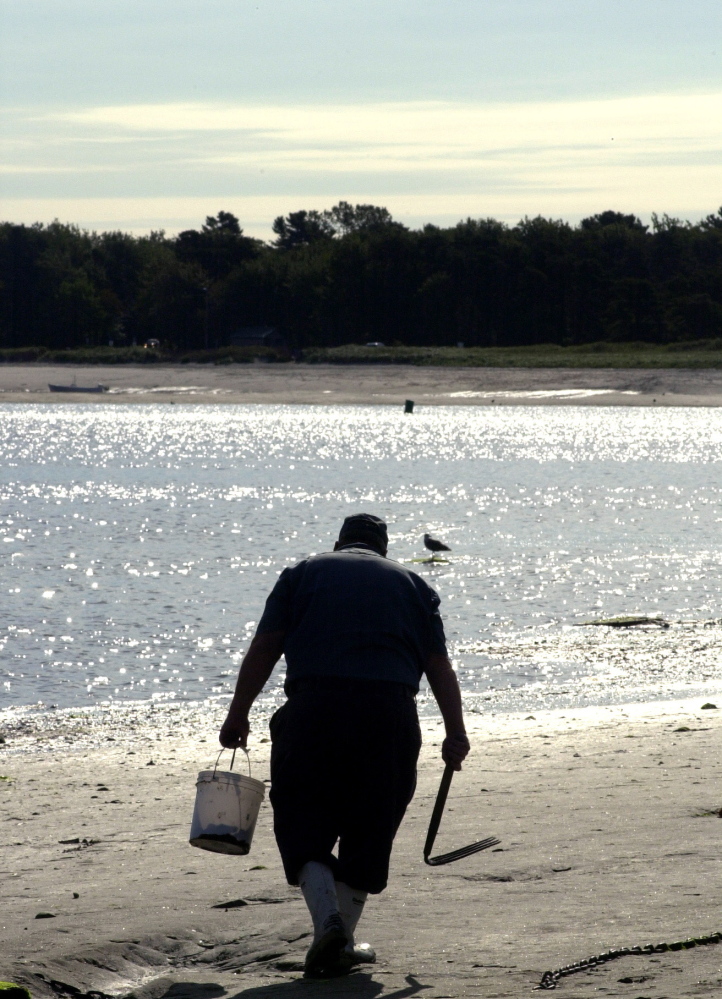FREEPORT — Clam diggers rely on a healthy marine environment in order to provide nourishing whole food to citizens and contribute to the economy. However, the ability of Maine’s diggers to continue their livelihood is in severe jeopardy due to the effects of climate change.
An invasive species of crab, the European green crab, has been able to proliferate in Maine’s waters due to Maine’s warming climate. This invasive creature is devouring Maine’s marine resources, and soft-shell clams are the first item on their menu. The problem is so severe that unless a comprehensive, coordinated crab control effort is mounted immediately, Maine’s soft-shell clam industry is in danger of disappearing.
Maine’s shellfish industry is an essential part of Maine’s culture and heritage. Maine is renowned for its soft-shell clams, and clambakes are an indispensable part of an ideal Maine summer. Shellfish have been providing sustenance to people along the Maine coast for hundreds of years. They are an integral part of our local food system, and a source of healthy protein.
As one of the most valuable fisheries in the state, they are also an important part of our economy. Since diggers and the infrastructure that supports the industry are based in Maine, more of the money generated stays in the` local economy, playing a key role in keeping our coastal economies diversified and vital.
The latest economic study by the University of Maine found that Maine’s shellfish industry is worth more than $55 million per year. Yet its total economic value could be up to nine times greater!
That is because only about 10 percent of Maine’s tidal flats are being clammed right now; an estimated 90 percent of Maine’s tidal flats are currently unproductive due to the green crab invasion and other factors.
The restoration of these tidal areas, including the removal of green crabs, would be a huge revenue boost for Maine’s coastal towns. Without the threat of the invasive green crab, clamming has the potential to provide a sustainable, renewable livelihood for Mainers far into the future.
Green crabs are not a new invasive species; they first entered the United States about 150 years ago. Since then, their populations have spread throughout the eastern seaboard, including up to Maine.
Though green crabs have no natural predators, Maine’s long, cold, icy winters kept their populations down.
However, Maine has been experiencing a warming trend since the 1990s. National Oceanic and Atmospheric Administration scientists are reporting that current New England ocean temperatures are the highest ever on record.
Our tidal flats no longer ice over every winter. This increase in temperatures is attributed to climate change caused by greenhouse gas emissions, such as carbon, and will get worse if emissions are allowed to rise unabated.
The increase in Maine’s temperatures has corresponded with the increase in the numbers of invasive green crabs. Unfortunately, the proliferation of green crabs results in increased predation on our living marine resources, and soft-shell clams are one of the crab’s preferred food sources.
For the past few years, clam diggers up and down Maine’s coast have been seeing a sharp rise in green crabs on the intertidal mud flats, while at the same time witnessing a decrease in clams yet to reach legal size. The decline is so severe that the collapse of the soft-shell clam fishery within one to two years is possible.
Horrifically, the devastation caused by the invasive green crabs will not stop with shellfish, as these predators of convenience will move on to consume other marine resources, including Maine’s valuable lobster population.
Recently, the Maine Clammers Association assisted the town of Freeport in implementing a green crab mitigation program, including trapping and exclusionary fencing. We’ve also been working with scientists to assess how well these resource protection methods work.
It is hoped that other towns and regions (such as the Casco Bay region) will pool resources to implement similar programs. However, the root cause of the green crab proliferation, Maine’s warming climate, must be addressed for green crab mitigation efforts to be successful in the long term.
Addressing climate change is a hefty task, but one promising move forward comes from President Obama’s plan to lower carbon emissions from coal burning power plants.
Limiting pollution from the burning of coal is a good first step toward alleviating the effects of climate change, and the president’s plan should be supported.
— Special to the Press Herald
Copy the Story LinkSend questions/comments to the editors.



Success. Please wait for the page to reload. If the page does not reload within 5 seconds, please refresh the page.
Enter your email and password to access comments.
Hi, to comment on stories you must . This profile is in addition to your subscription and website login.
Already have a commenting profile? .
Invalid username/password.
Please check your email to confirm and complete your registration.
Only subscribers are eligible to post comments. Please subscribe or login first for digital access. Here’s why.
Use the form below to reset your password. When you've submitted your account email, we will send an email with a reset code.